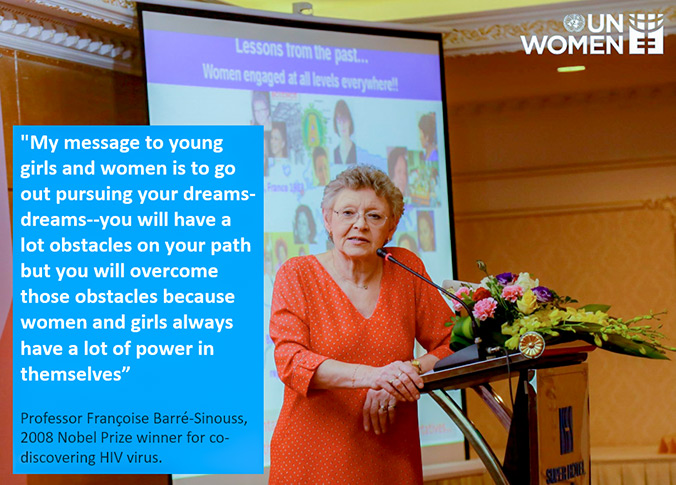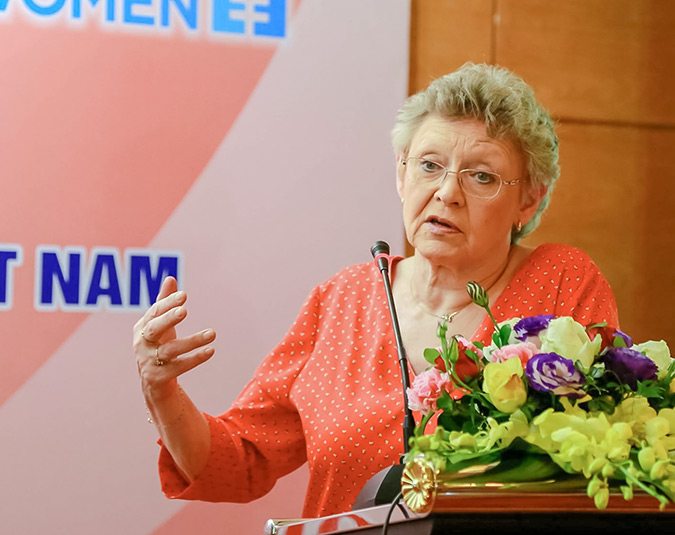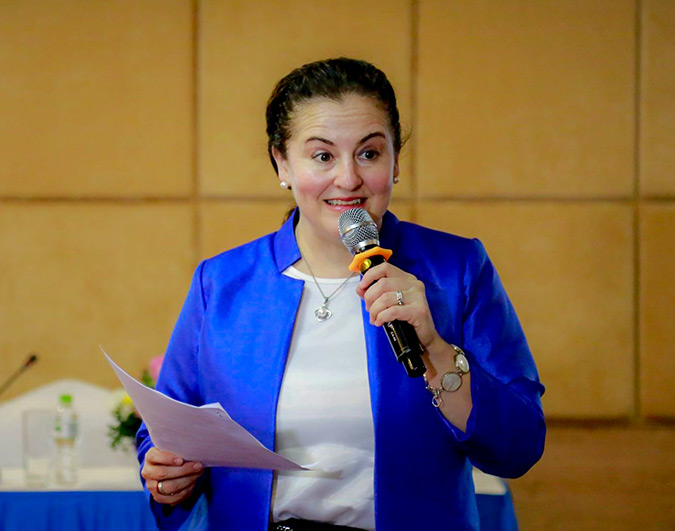Women's participation in decision-making key to controlling HIV spread in Viet Nam, says the co-discoverer of the virus
Date:
Author: Thao Hoang
Ha Noi, Viet Nam — To control the spread of HIV, Viet Nam must protect the rights of affected women and have them participate in making HIV prevention and response policies and in carrying them out, say experts including the virologist who helped discover the virus.

Professor Françoise Barré-Sinoussi, a member of the National Academy of Sciences in France who won the 2008 Nobel Prize in medicine for her work, joined other experts in discussing the gaps in Viet Nam's HIV response at a national conference in Ha Noi on 17 January. More than 50 participants from government agencies, international organizations, academia, civil society groups, networks of women living with HIV and other groups took part.
The Government has committed to end its HIV epidemic by 2030. But a study published in 2017 by Vietnam Administration of HIV/AIDS Control and UN Women, Gender Assessment of Viet Nam's HIV Response, said this commitment has yet to be translated into HIV policies, programmes and budgets. And the national response to HIV has failed to adequately meet the needs and rights of affected women and girls, it said. The study also said that civil society groups, particularly women's groups helping those living with HIV, have not been brought in on HIV policy development and implementation. The study's findings were reviewed at the conference in Ha Noi.
In her speech, Professor Barré-Sinoussi talked about the HIV burdens of women and girls, their gender-based vulnerabilities, and the need for a multipronged response.

"One of the most important strategies, as a lesson learned of many other countries after years fighting against the HIV epidemic, was to guarantee women's engagement in all levels and stages of the preventing and responding process," she said.
She said men and boys need to be part of the solution to address gender inequalities in the HIV response, starting from informing and educating them about sexual and reproductive health and rights and engaging them in transforming gender relations.
Professor Barré-Sinoussi added: "My message to young girls and women is to go out pursuing your dreams--you will have a lot obstacles on your path but you will overcome those obstacles because women and girls always have a lot of power in themselves"

Elisa Fernandez, UN Women Head of Office in Viet Nam, said: "HIV-affected women and girls are facing gaps and constraints in accessing prevention, treatment, as well as care and support services. Women, particularly those most affected by the epidemic, largely remain on the margins of policy and decision-making spaces."
Ms. Fernandez said a gender-sensitive HIV response would need to focus on improving access to sexual and reproductive health and HIV services, mobilizing communities to eliminate unequal gender norms and behaviours including gender-based violence, and investing in women's leadership in HIV response.
Women are more vulnerable to the epidemic than men because, among other things, they have a higher risk of HIV infection per sex act and pregnancy doubles the risk of infection. Sexual coercion or early marriage also increase vulnerability to HIV, particularly among adolescent girls and young women.
According to Gender Assessment of Viet Nam's HIV Response, in 2014 there were an estimated 256,000 people living with HIV in Viet Nam, 66,000 (about 26 per cent) of them women. The report said the number of new HIV infections has stabilized at around 14,000 per year since 2010 but a substantial proportion of them are occurring among women who are in long-term sexual relationships with infected men, particularly men who inject drugs, but also men who have sex with men and men who buy sex. Studies show that nearly 54 per cent of infections among all women in Viet Nam can be solely attributed to the risky behaviours by their male sexual partners. While the proportion of men infected has been declining, the proportion of women infected has been increasing.
To strengthen Viet Nam's HIV response, the Ha Noi conference recommended:
- Enhancing political commitment to address gender inequality and HIV
- Reforming laws and policies o Building knowledge and evidence around vulnerabilities of women and girls in all their diversity
- Correcting gender-related problems in service provision and implementation
- Strengthening community engagement and participation of key affected women and girls
- Removing structural barriers to gender equality
For more information, please contact:
Hoang Bich Thao, Communications Officer
UN Women Viet Nam
Tel: +84 4 3850 0376; Mob: 012 0514 3996
Email: hoang.thao@unwomen.org